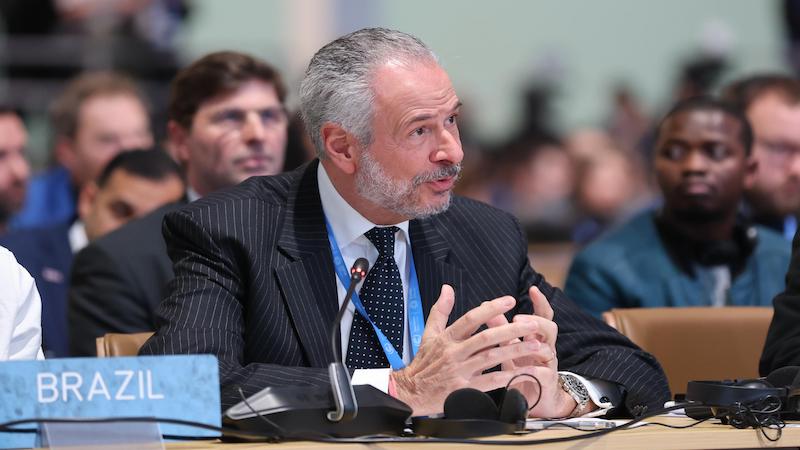Brazil has appointed veteran climate diplomat André Aranha Corrêa do Lago to lead this year’s COP30 UN climate summit in November in the Amazonian city of Belém.
Corrêa do Lago has been Secretary for Climate, Energy and Environment at Brazil’s foreign ministry and Brazil’s chief climate negotiator since 2023 when President Lula da Silva returned to power. He had previously held the same role between 2011 and 2013 and has worked on sustainable development related issues since 2001.
A career diplomat, he served as Brazilian ambassador to India and Japan. He is also a well-regarded architecture critic and curator.
He will be the fifth man in a row, and the 25th man out of 30, to be COP President. Ana Toni, Secretary of Climate Change at the Brazilian environment ministry, will be the COP30 CEO and Executive Director while environment minister Marina Silva will be without a formal role.
Brazilian climate campaigners broadly welcomed his appointment. Claudio Angelo, head of international policy at Observatório do Clima, said President Lula “has made the right call” by appointing Correa do Lago. “The ambassador has the respect of the international climate community and a deep knowledge of the multilateral process,” he added.
But Angelo also warned that Correa do Lago will need full support from Lula “to move forward the agenda in the most challenging year ever for climate diplomacy”.
Toya Manchineri from the Coordination of Indigenous Organisations of the Brazilian Amazon said his appointment “represents a positive effort but still does not guarantee what we truly expect: the centrality of Indigenous peoples in climate discussion”.
“As a COP in the Amazon, it is essential that our voice, as historical guardians of the forests, be at the heart of the debate,” Manchineri said.
His appointment comes a day after US President Donald Trump started the process of withdrawing the US from the Paris Agreement on his first day in office. But, as leaving the Paris Agreement takes a year, the US will still be a member at COP30 and has not yet indicated that it will leave the United Nations Framework Convention on Climate Change (UNFCCC).
‘Intense year’
COP presidents play a crucial role in shaping the agenda of climate summits and in helping broker deals between countries.
Last December, Corrêa do Lago said much expectation had been placed on Brazil because of the country’s traditional role in shaping the climate agenda. “It is going to be an extremely intense year of action to ensure that COP30 brings the best possible results,” he said.
Coming 10 years after the adoption of the Paris climate agreement, COP30 is the first opportunity for countries to take stock of the new round of nationally determined contributions (NDCs) which will offer a temperature check on global plans to reduce emissions and adapt to the impacts of climate change.
Brazil has already unveiled its updated goal of cutting emissions between 59% and 67% from 2005 levels by 2035, mostly by relying on its carbon-storing forests. Lula’s government has insisted the plan is aligned with the Paris goal of limiting global warming to 1.5C, but experts said it ignores the country’s looming fossil fuel expansion.
In Belém, governments are also expected to advance fraught negotiations on steps towards transitioning away from fossil fuels, a global goal on adaptation and climate finance.
Following deeply divided talks, countries agreed at COP29 that wealthy governments would channel at least $300 billion a year by 2035 to developing countries under the so-called new collective quantified goal (NCQG).
A larger target of $1.3 trillion a year was also set in Baku to scale up all sources of climate finance, including private investments in the Global South that are not linked to governments. But countries did not detail how the broader goal would be reached, establishing instead a vague programme called the “Baku to Belem Roadmap to 1.3T” due to be completed by COP30.
Speaking about the climate finance agreement last December, Corrêa do Lago said Brazil needs investment and not donations.
“When it comes to talking about finance, rich countries forget the measure of urgency regarding climate change,” he said. “They talk a lot about urgency when they talk about targets, initiatives and NDCs. But when it comes to talking about finance, the element of urgency is kind of forgotten.”
Corrêa do Lago will become the first COP president in three years not to have hailed from the fossil fuel sector which is responsible for the vast majority of global emissions.
COP28 president Sultan Al-Jaber led climate negotiations in the United Arab Emirates in 2023 while simultaneously being at the helm of the Abu Dhabi National Oil Company (ADNOC), the nation’s state-owned fossil fuel company. Meanwhile, COP29 president Mukthar Babayev spent 26 years at Azerbaijan’s state-owned oil and gas company Socar before becoming the country’s environment minister.
(Reporting by Matteo Civillini; editing by Joe Lo)
